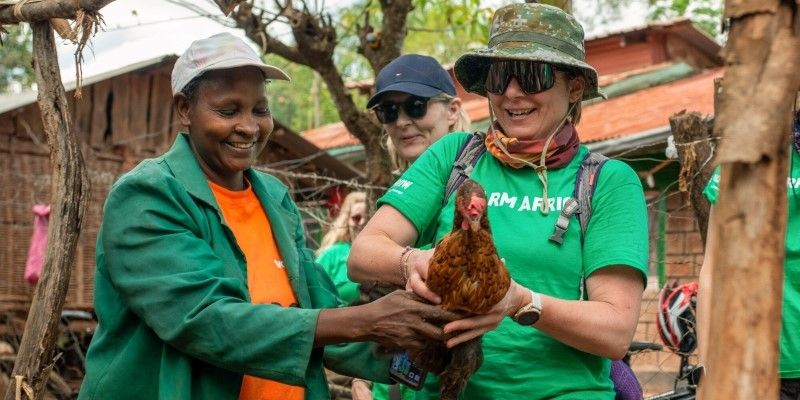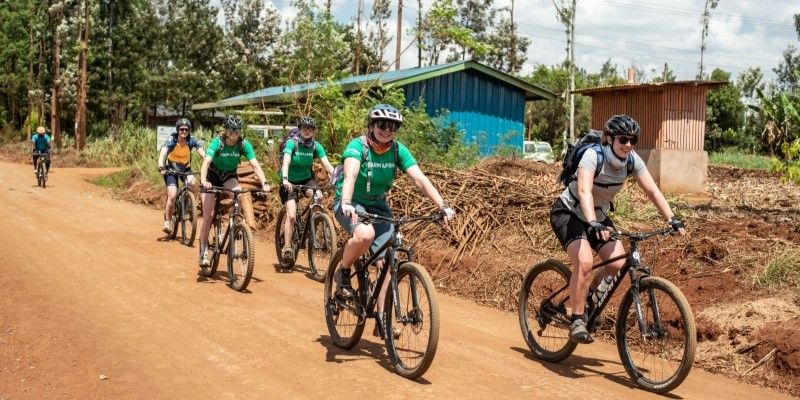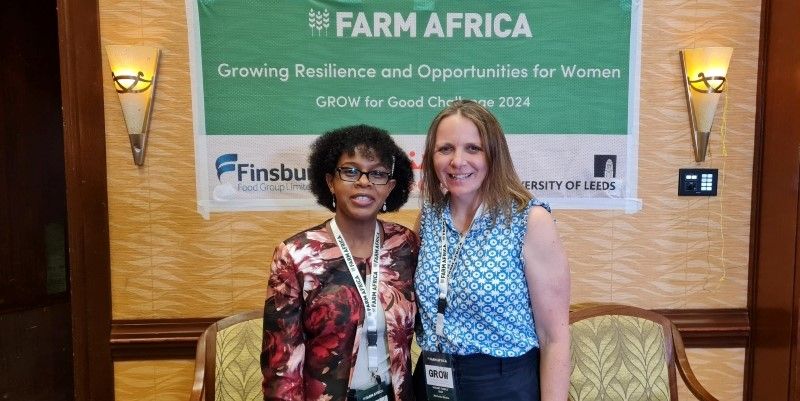
A team of women have taken on a cycling challenge across Kenya to support female farmers.
Professor Michelle Morris, Professor of Data Science for Food in the Faculty of Environment, took part in the Growing Resilience and Opportunities for Women (GROW) for Good Challenge to help boost farm production and support training in regenerative agricultural techniques.
The challenge, which was set by charity Farm Africa, was undertaken by an all-female team of 12 leaders from the food and farming sector.
Professor Morris cycled 75km around regenerative agriculture farms in Embu Country, Kenya, raising funds to grow better futures for female farmers. To add to the physical challenge, Professor Morris has cycled and run the equivalent of the length of Kenya – 1,132km, the majority of which was covered in Yorkshire with the final 75km in Kenya.
Professor Morris said: “I have seen first-hand the impact of Farm Africa's work with women in these farming communities and it is life changing.
“I am proud to be part of Team GROW, leaving a legacy that Grows Opportunities and Resilience for Women in Kenya.
“The cycling part of the challenge was a really special way to see the country, whilst tough with the altitude and steepness of the unsealed roads.”

Professor Michelle Morris cycling across Kenya with the Farm Africa team.
On the farms, the team worked on a variety of farming activities including composting and mulching. This technique helps farmers increase crop yield in a more sustainable way and reduces costs. The group also learnt about the challenges faced by Kenyan female farmers.
I have seen first-hand the impact of Farm Africa's work with women in these farming communities and it is life changing.”
Farm Africa’s regenerative agriculture project is helping to increase farm production in Kenya with the aim of training 250 village-based advisors (VBAs) in regenerative agriculture techniques. By sharing this knowledge with more farmers across the counties, they support them to grow more fruit and vegetables at home. The training covers post-harvest handling, storage, kitchen garden establishment and agri-business acumen.
Professor Morris added: “I really enjoyed meeting with the Kenyan women famers and seeing what their daily activities are like.
“With my passion for data, meeting the data clerks, who measure and record processes on the farms was really insightful and it was fantastic to hear they are expanding this to include measuring carbon credits.”
The GROW for Good challenge is aiming to raise £75,000 to grow knowledge, resilience and a better future through regenerative agriculture. Farm Africa opens up new opportunities for female farmers across Eastern Africa, helping them to develop new streams of income and work their way out of poverty, while protecting local ecosystems for generations to come.
Anissa Msallem, Head of Partnerships for Farm Africa, said: "The GROW for Good Challenge is bringing together women across the global food system around the power of sustainable agriculture to change people’s lives and protect the environment. We are grateful to them for taking on this unique challenge and the impact they will make."
At the end of the challenge, Professor Morris and the team took part in a round table with female leaders from food and farming in Nairobi, Kenya to raise awareness of the need to drive positive change for women in the global food system.
Among the leaders was Africa International Collaboration Group Member Dorothy Murugi. Professor Morris added: “It was fantastic to have Dorothy join our round table event and make important contributions to what is needed to ensure a prosperous and rewarding future for female farmers in Kenya.
“I connected with Dorothy via the Africa International Collaboration Group and it turns out we have a lot of research interests in common. I look forward to continued discussions.”

Professor Michelle Morris with Dorothy Murugi.
Also during the trip Professor Morris met with Global Food and Environment Institute (GFEI) partners on the iSPARK project at a workshop convened with the purpose of Building Capacity in Data Science.
Professor Morris shared her experiences of building the Leeds Institute for Data Analytics and the Consumer Data Research Centre as platforms to enable data sharing, alongside establishing Centres for Doctoral Training in Data Science and the LIDA Data Scientist Development Programme.
The workshop was held at the International Livestock Research Institute with partners from Kenya Agricultural and Livestock Research Organisation (KALRO) and Alliance of Bioversity International and the International Centre for Tropical Agriculture (CIAT).
Professor Morris added: “I was really impressed with data, data visualisations and research data infrastructure the KALRO and CIAT teams have set up. It was exciting to explore ways to build upon this moving forwards.”
Further information
For more information, please contact Rebecca Hurrey in the University of Leeds Press Office.